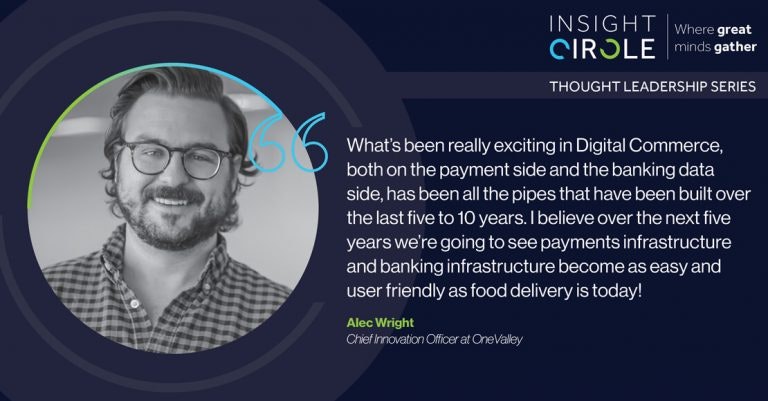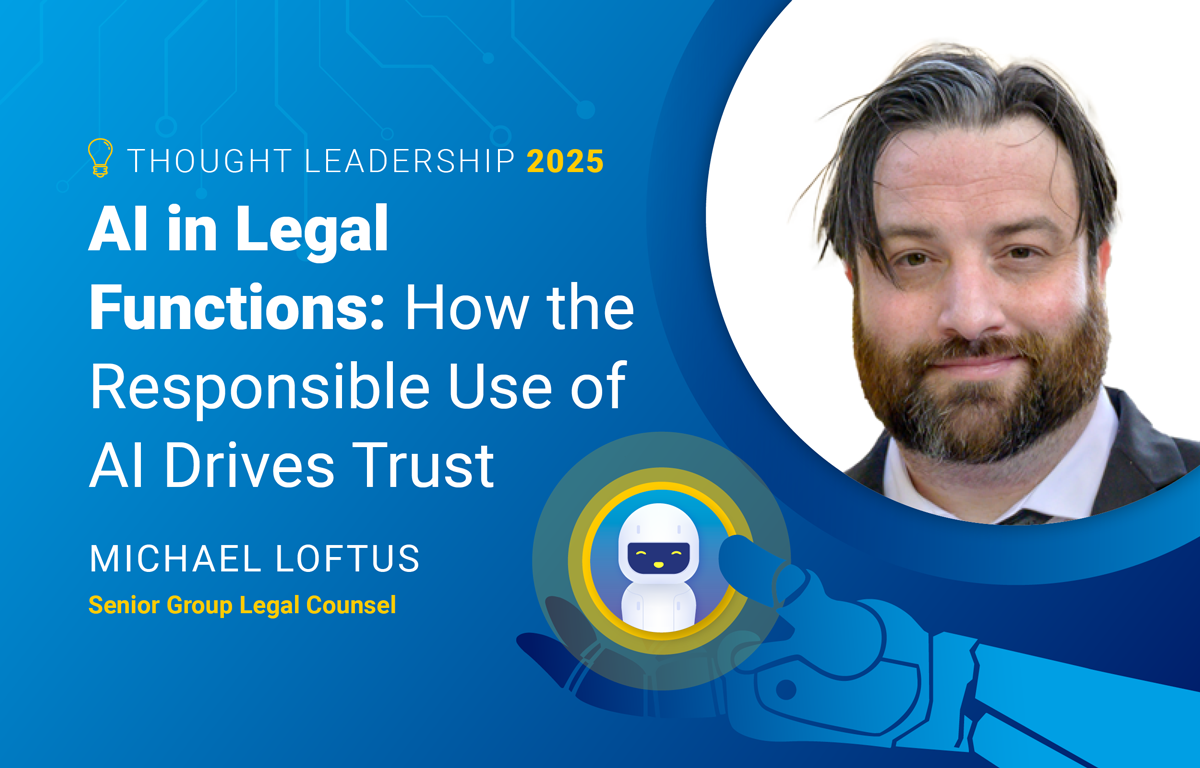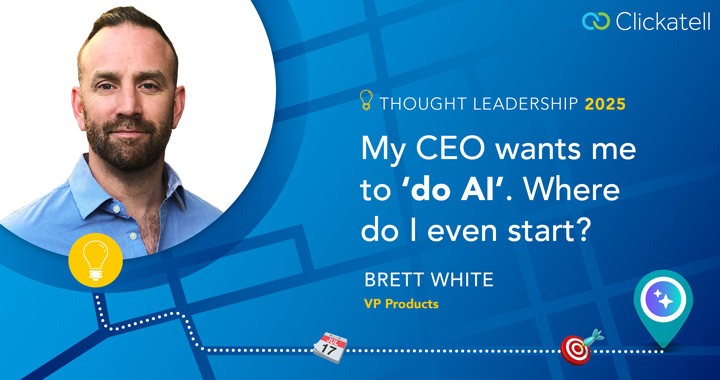
Our most recent guest in the Insight Circle Series, Alec Wright, Chief Innovation Officer at OneValley, is in a unique position to view the emerging Digital Economy. On the one hand, his primary mandate is to support, empower and accelerate early-stage technology entrepreneurs and innovators, primarily in the startup community. On the other, he and his team also serve as a bridge into the large enterprises and see how the latest technology is being adopted by enterprises and industries that may be 50, 100 or even 200 years old.
Key Macro Trends
We asked Alec about some of the most important macro trends he is observing: “One key macro trend that's occurring that's really exciting is the entrepreneurship phenomenon and the rise of digital startups and emerging technologies where the rate of innovation has gone through the roof over the past decade! Every industry is being disrupted at the margins by emerging technology and this is being manifested by important trends like the adoption of cloud and big data inside large enterprises, IoT and mobile impacting different spaces, and advances in artificial intelligence and machine learning.
This broader phenomena around the age of innovation and entrepreneurship is then manifesting into some core trends that are at a really nice inflection point of gaining adoption inside large enterprises. Probably the single biggest opportunity I see is the general digital connectivity between historically siloed systems - moving from siloed legacy systems on premise to cloud-based applications that allow for a more effective flow of data and information and collaboration across an organization.
I think this segues powerfully into the big data and AI opportunities. Over the past five years or so, a lot of enterprises have started running AI experiments but only in concentrated places inside the enterprise. What we're seeing now is some of the most successful use cases spawning, slowly but surely, into a broader adoption of these technologies inside the organization. There’s no question that there's massive ROI being delivered today in certain areas, like the “low hanging fruit” inside enterprise with big data around customer retention and churn prevention. Until recently, a lot of companies either didn't use the mounds of data they had, or weren't sure how to derive insight out of it and act on it. We're also seeing huge opportunities in procurement and supply chains and some of these “unloved” parts of the enterprise that have tens to hundreds of billions of dollars at stake but haven't typically gotten a lot of attention. With the right data technologies, they have the potential to generate massive ROI.”
Voice and AI
Alec also discussed the intersection of voice and AI: “The enterprise voice space is a really exciting one. It's a great example of something that has been highly experimental inside a lot of industries but now is really starting to get widespread adoption. Great examples are the call center and other areas where voice is the primary way that customers communicate, and enterprises are getting smarter about how they use artificial intelligence to drive these customer interactions. Then you also see billion dollar plus emerging technology companies focused on the conversational AI space. I think on the consumer voice side, the ecosystems around Alexa and Google are still quite “fun”, but haven't developed in the way people might have anticipated. However, I think it's just a matter of time until that killer consumer voice use case outside of the personal assistant really takes off!”
Digital Commerce
We asked Alec about trends in Digital Commerce: “What's been really exciting in Digital Commerce, both on the payment side and the banking data side, has been all the pipes that have been built over the last five to 10 years. Companies like Plaid have been transformational for the financial services industry. There is also a trend of every brand starting to become like a bank and to offer financial services. I think Stripe could be the next trillion dollar company with what they're doing in payments and building out a democratized payment infrastructure. I believe over the next five years we're going to see payments infrastructure and banking infrastructure become as easy and user friendly as food delivery is today! This is one area that OneValley Ventures, our early-stage venture arm, is spending a lot of time and always excited to meet innovators working around digital commerce.”
Impact of COVID-19
Alec shared how the COVID-19 crisis has impacted different companies and industry sectors: “The crisis has affected different industries in different ways. There has been unbelievable acceleration in online learning, robotic process automation, workspace workforce collaboration, biotech and healthcare. There's another subset of companies that have just been devastated, like those in the travel and hospitality space as well as brick and mortar retail. Then there's everyone in the middle who's trying to diligently grow their business in the middle of this upheaval that's happening inside economies and industries. I’ve been so impressed by the discipline and focus of the early stage and growth founders we’ve seen this year at One Valley. On the large enterprise side, I think there's been a real focus on mission-critical functions. There's been a huge investment in core IT infrastructure as large enterprises have had to figure out how to function remotely and collaborate digitally. The other areas of innovation that haven't become mission critical to the workforce or aren't aligned with the booming sectors in this COVID world are seeing a lot of their budget reduced and have taken a backseat to more immediate firefighting needs.”
Startups and Venture Capital
We asked Alec for his perspective on startups and venture capital in the current environment: “I think there has never been a better time to be a founder or to start a company. There’s a combination of capital availability and the validation of the opportunity to build massive breakthrough businesses in all these different industries. There is also the technology infrastructure that exists today that makes it easier to validate and launch a startup at a fraction of the cost of before. This being said, there are still problems with inequity (i.e. outside of white male founders with traditional networks) so I think there is massive work that needs to be done to make the promise true for all founders. On the investor side, it’s very competitive today. When COVID hit, there was an initial conversation around if venture capital was going to dry up, but I think the market answered that question - there is as much capital being deployed today as at any time and it's being deployed as aggressively as ever. There is new data that came out showing that the slight drop in valuations we saw in Q2 and Q3 (2020) is gone, and we're back to pre-pandemic valuation levels. Venture investors are competing aggressively to participate in these really exciting early stage companies that are coming from repeat founders, so venture funds are really having to compete to access this great deal flow.”
Societal Implications
We asked Alec to share his perspective on the societal impact resulting from rapid technological change: “I think there are two major forces happening now. One is the adoption of technology in our lives. Looking historically at how technology is developed and gets to widespread adoption, it is much faster today than before. It has increasingly become embedded, ubiquitous and intuitive. For example, 15 years ago if you wanted a webcam, you bought a big, clunky, external webcam and there was a huge setup process. You needed a fair degree of sophistication to get your webcam running. Today, every device in the world has a camera embedded that just runs and is a central piece of infrastructure inside the device, like connectivity or a battery might be. I think we're seeing this trend of the technology first being a clunky add-on, whether it’s voice, IoT, or AI and personalization, but then it increasingly gets more embedded and more intuitive. It seems that we're bad at predicting which trends are going to happen first and where these real changes are going to happen. For example, we thought the Smart Home was going to be a lot smarter than it is today! The second major area I think will really define us is the fight between automation and human capital. The one thing we know for sure is that over the next 20 years, the world is going to get increasingly automated and it’s going to impact nearly every industry. It will affect what we traditionally call “blue collar work”, “white collar work”, and everything in between. The workforce of today is not going to exist twenty years from now, and I think the only countervailing force that we have against this is human capital and our ability to rescale, retrain and educate at scale for the future. If we can't do this well, I think in many ways automation may become more of a challenge than an opportunity!”
The United States in the Global Digital Economy
We also asked Alec about the challenges for the United States in the emerging global economy: “At OneValley we spend a lot of time globally and I have the pleasure of interacting with innovation ecosystems and innovation leaders in Europe, Asia, the Middle East, Africa and Latin America. I can clearly see there is a global hunger for innovation and entrepreneurship that is just unprecedented in my opinion. When you go around the world, you can sense the energy, and a lot of that energy was historically associated with Silicon Valley. My impression is that the rest of the world is incredibly focused and committed to supporting their innovation economy, supporting their digital economies, and using this as a catalyst for growth. So unless the United States is able to match this vigor and commitment, I think increasingly we're going to lose the industries of the future. There are these questions of: Are we losing AI to various places? Are we losing the future of healthcare? Are we losing the future of smart cities and clean technology? Each of these are multi-trillion dollar industries that will have disproportionate gains flow to the countries and companies that are their respective industry leaders. Therefore, I think it's imperative for the United States to figure out how to maintain a role as an industry leader in these industries of tomorrow.”
We are grateful to Alec for sharing his insights on such a broad range of subjects and hope this conversation sparked additional thoughts for you. Please let us know your perspective on any of these topics in the comments section and we will try to incorporate your questions into future conversations with Alec and our other guests.
Step into the future of business messaging.
SMS and two-way channels, automation, call center integration, payments - do it all with Clickatell's Chat Commerce platform.








